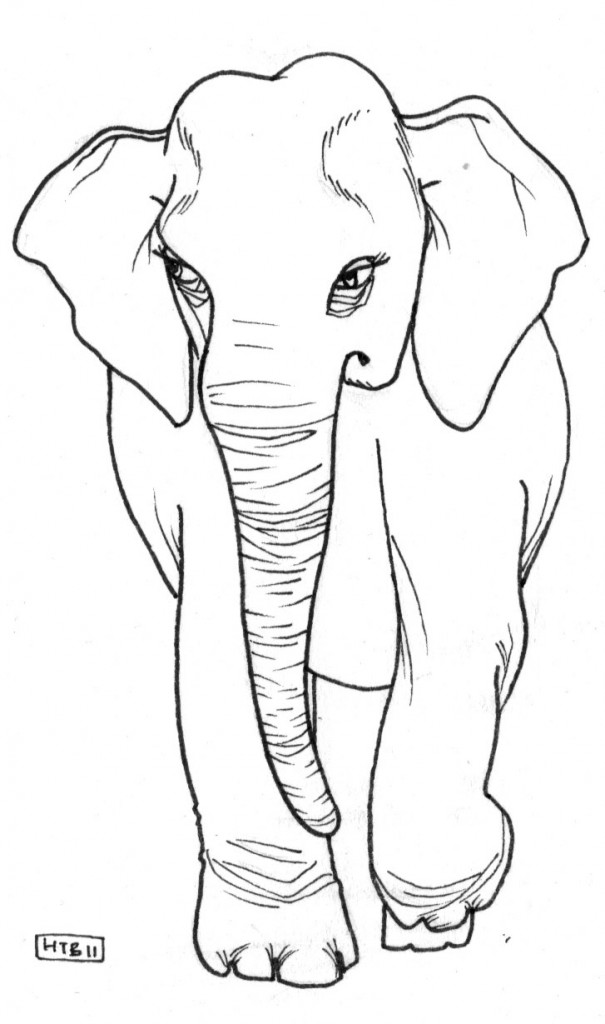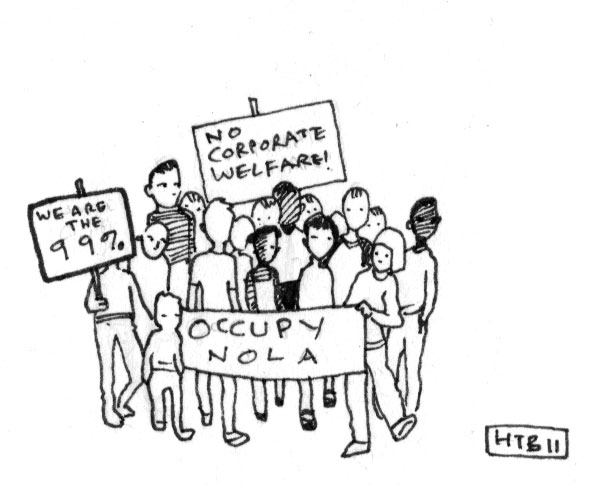by Ben Last
 I’ve been involved with Occupy NOLA since several days before the first General Assembly in Washington Park. I slept there every night of the first week on my weird Mexican poncho. Every step of the way I’ve enjoyed participating in a totally different effort from what I’m used to. It’s brought all aspects of working to create an autonomous free society to one place. Rather than sneaking around with like-minded comrades, I’ve discussed my views and tactics with folks with all sorts of positions in broad daylight. Above all else, the experience has been enriching and, for the most part, inspiring. There has been a nagging worry in my head however: the issue of race is a huge elephant of color in the room.
I’ve been involved with Occupy NOLA since several days before the first General Assembly in Washington Park. I slept there every night of the first week on my weird Mexican poncho. Every step of the way I’ve enjoyed participating in a totally different effort from what I’m used to. It’s brought all aspects of working to create an autonomous free society to one place. Rather than sneaking around with like-minded comrades, I’ve discussed my views and tactics with folks with all sorts of positions in broad daylight. Above all else, the experience has been enriching and, for the most part, inspiring. There has been a nagging worry in my head however: the issue of race is a huge elephant of color in the room.
I grew up an ambiguously brown kid in a white-as-a-sheet town in New England. I’m almost equally comfortable with white and black people; increasingly, I find this a rare position to be in. In our occupation there seemed to be a tension along race lines and a high resistance among both sides to address it. Some of the older black guys who had participated in the previous occupation of Duncan Plaza by the homeless told me secretly they didn’t feel totally welcome in this more recent “occupation.” Left unaddressed, I believe this issue may be the key to Occupy NOLA’s failure.
In reaction I helped in the formation of a “people of color” caucus. That group, along with a much larger Anti-Racist Action Committee, proceeded to discuss the nature of tyranny baked into the system that runs our city and nation with a focus on racism, how these dynamics manifest themselves in Occupy NOLA, and how best to work past them. All over the country virtually every occupation contains groups with the same intentions.
Several folks, however, some of them black, felt these were unnecessary or superfluous in our occupation. One woman accused me of trying to segregate the occupation. All over the country and here in NOLA the occupy movement has been actively critiquing our economy and the way we’re governed. However, the attitude around the camp seems to suggest that institutional racism in and outside of the occupied area is either irrelevant, non-existent, or will simply fix itself. This is apparent by the lack of contact with long-time community organizations and individual organizers in the days leading up to the first march here in New Orleans. Since day one there has been little to no input sought or presented from these same key allies. Beyond mere representation, I think that Occupy NOLA can only become a locus for a revolution against tyranny if all constituencies of our city combine their efforts here; until that happens, we will fail to make a difference.
 Like all relationships, our interactions between race on the individual and community levels are heavily prescribed. Stereotypes are either taught or gleaned through a individualistic, fearful lens placed on us by our capitalist, top-down, sexist, racist system. In trying to create a truly free society with its equivalent individual relationships we should not forget the baggage we bring in. This is true equally for concepts and actions we deem positive, negative, or neutral. It’s important we disregard irrational fear of the unknown, but also that we be open to the idea that the image and logistics of liberation are different along color lines. To put it simply, many people may not feel a freedom in sleeping on the ground, eating outside from pots, and painting declarations on cardboard. For me this resembles revolution, but for others it may resemble skid row.
Like all relationships, our interactions between race on the individual and community levels are heavily prescribed. Stereotypes are either taught or gleaned through a individualistic, fearful lens placed on us by our capitalist, top-down, sexist, racist system. In trying to create a truly free society with its equivalent individual relationships we should not forget the baggage we bring in. This is true equally for concepts and actions we deem positive, negative, or neutral. It’s important we disregard irrational fear of the unknown, but also that we be open to the idea that the image and logistics of liberation are different along color lines. To put it simply, many people may not feel a freedom in sleeping on the ground, eating outside from pots, and painting declarations on cardboard. For me this resembles revolution, but for others it may resemble skid row.
So our space at present doesn’t feel totally inclusive or welcoming. I would not suggest that this majority-white occupation try to anticipate what attracts people of color. A quick recall of UPN in the 1990s will show the inevitable insulting calamity that kind of thinking brings. There are some things we can do to the space to make it seem more welcoming, however, and we should also welcome people to fully participate and share their views even if they don’t wish to sleep in the park. In a society, people should be allowed to participate as best they can, without risk of being called out as not really being “totally down with the movement.”
The key to the total smashing of an alienating environment rests in successful outreach coupled with keen self-awareness. Thus far our collective attitude seems to be that the onus rests on individuals to get involved, but we have to recognize that we are not viable without the rest of the 99%. For people of color all over the country and all over this city the issue of systematic racism, which encompasses inequalities around housing, education, wages, workers’ rights, judicial practices, prisons, medical treatment and nutrition, remains a key demon to be cut down. Our negligence in recognizing that has held back our movement from resonating with the majority of New Orleans’ inhabitants.
How do we move forward, given what I have said? The good news is that a lot of work is being done currently by several working committees, including Anti-Racist Action. This work should be supported. We must work to be a strong and reliable ally. We must extend our hand as comrades and never presume to tell hard-struggling peoples how to fight; they already know. As individuals we have to go about the business of evaluating our own prejudice, where it comes from, and how it limits our ability to wage change. This issue speaks to a problem within our movement and should always be kept in mind as we go forward towards a free and truly democratic society.
Share